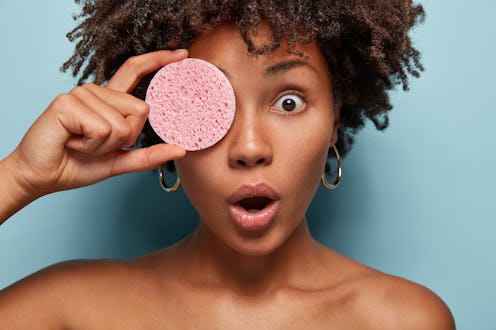Style
This Is How Long Experts Say It Takes For Exfoliation To Start Working

Exfoliating your face is one of the most important pillars of a skincare routine. It's the ultimate skin reset that sloughs away dead skin cells, keeps things looking radiant, and aids stressed out skin. But to many of us, exfoliation still remains a bit of a mystery. How often should you exfoliate, and what should you even use? How long does exfoliation take to work, too? Let's take a deep dive into all things scrubby and acidic by attempting to answer these exfoliating queries.
Why exactly do we need to exfoliate?
So we all *kind of* know why we should exfoliate the skin on our face, but also, if someone asked us, we may not be able to give a straight answer. So let's clear it up once and for all.
"The real result you are looking for with exfoliation is to slough off dead skin cells from the surface of the skin in order to aid the desquamation cycle and improve skin cell turnover," explains Megan Felton, co-founder of expert led skincare consultancy Lion/ne.
"Exfoliation is also important for hydration of the skin, which seems counterintuitive, but dead skin cells on the surface of the skin will not allow hydrating ingredients to work as well as they can!"
How long does exfoliation take to work?
So we've established we should all be exfoliating, but how long exactly does a product actually take to do the exfoliating, and how long until we actually get to see results? "It really depends on the type of exfoliant you are using," explains Felton. "For gentle exfoliants like PHAs it might take more time to see results, but with something like a manual scrub the result will be more instant. That's not necessarily a good thing, though; if you are getting that 'instant' result from an exfoliant, this might mean it is more harsh and should be used in moderation.
"With BHAs it is a little bit different, because they will work more into the pore and try to help with inflammation and oil flow."
So just because you may not see an 'instant' result, that doesn't mean your chosen product isn't working effectively.
How often should you exfoliate?
How often you should exfoliate depends on a multitude of things, including what your facial skin type is and your chosen exfoliating method. However, the general consensus is that about two or three times a week is a good place to start. Dove dermatologist Mona Gohara, MD, told Byrdie: "We lose 50 million skin cells a day, and if they remain on the skin, it can look dull and dry." Therefore, it's really important we exfoliate enough.
But it's equally as crucial not to over-exfoliate, in order not to do more harm than good. Daniel Behroozan, MD, FAAD, director of the Dermatology Institute of Southern California and assistant clinical professor of dermatology at UCLA School of Medicine, also shared with Byrdie that, "people with hypersensitive skin will likely be able to tolerate [exfoliation] only once or twice a week."
Essentially, if you're new to exfoliating, twice a week is a good starting point, before seeing if you're able to build it up a little.
What should you use to exfoliate?
The jury's out on whether you should stick to traditional face scrubs or opt for a more modern alternative in the form of a liquid exfoliant. Then there's exfoliating mitts...
However, many skincare experts would these days agree that abrasive scrubs can actually cause more harm than good, especially if you have sensitive or damaged skin. David Delport, Head Of Education at Ren, once told me that “over-scrubbing can cause micro tears in the skin, causing sensitisation and an easy pathway for bacteria and pathogens to enter," while renowned expert Dr Dennis Gross is a huge advocate for liquid exfoliation, sometimes comparing manual scrubs to sand paper.
Some of the best liquid exfoliants I have come across include the Dr Dennis Gross Alpha Beta Universal Daily Peels, which come in little squares of material saturated in gentle exfoliating AHAs. The Pixi Glow Tonic is also a brilliant choice, and a classic.
This article was originally published on